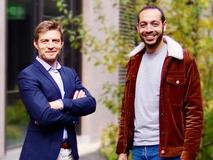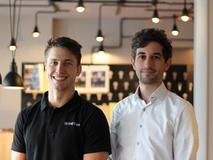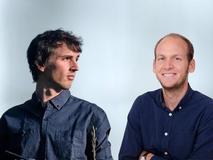CH 40,000 for a novel drug delivery system to prevent stenosis, a patented biomaterial platform revolutionizing the way drugs can be administered to patients, and mangrove restoration to speed-up carbon capture
23.01.2023
ArtemiX Biotech, InkVivo, and Inverto win Venture Kick's second stage of financial and entrepreneurial support. Their project intends to prevent vessel stenosis and increase the primary patency success rate; have developed a system that can precisely release mangrove seeds from drones; and combine a patented biomaterial platform with additive manufacturing to produce and customize resorbable drug delivery systems tuned to the clinical challenge.
 |
ArtemiX Biotech: a novel drug delivery system to prevent stenosis
 Chronic kidney disease (CKD) is a serious, life-threatening, and growing health problem affecting millions of patients worldwide. Patients with CKD have significantly reduced kidney function, most commonly due to diabetes or hypertension. Every year, close to one million Kidney Failure Patients will need to start hemodialysis therapy worldwide. Hemodialysis is a chronic life-saving procedure where the blood is pumped through a hemodialysis (blood filtering) machine. The safest approach is for a surgeon to create a Vascular Access (VA) in the patient’s arm to connect the hemodialysis machine. Unfortunately, within the first year after surgery, up to 50% of these VA will suffer failure resulting in the blockage of the blood flow. The VA blockage is associated with increased morbidity, mortality, and healthcare costs. A recent study indicated that the total cost of managing hemodialysis vascular access failure in patients with kidney failure was more than USD 15’000 per patient per year, meaning a total global annual cost of around USD 7.5 B per annum.
Chronic kidney disease (CKD) is a serious, life-threatening, and growing health problem affecting millions of patients worldwide. Patients with CKD have significantly reduced kidney function, most commonly due to diabetes or hypertension. Every year, close to one million Kidney Failure Patients will need to start hemodialysis therapy worldwide. Hemodialysis is a chronic life-saving procedure where the blood is pumped through a hemodialysis (blood filtering) machine. The safest approach is for a surgeon to create a Vascular Access (VA) in the patient’s arm to connect the hemodialysis machine. Unfortunately, within the first year after surgery, up to 50% of these VA will suffer failure resulting in the blockage of the blood flow. The VA blockage is associated with increased morbidity, mortality, and healthcare costs. A recent study indicated that the total cost of managing hemodialysis vascular access failure in patients with kidney failure was more than USD 15’000 per patient per year, meaning a total global annual cost of around USD 7.5 B per annum.ArtemiX, patent protected, long-acting drug delivery system for the local sustained release of an active drug intends to prevent vein blockage and increase the primary patency success rate. The total addressable market of ArtemiX is evaluated between CHF 1 to 1.5 billion per year.
ArtemiX is made up of a team of dedicated entrepreneurs, closely supported by seasoned pharma industry professionals and disease experts. Artemix Project Leader and CEO Dr. Laurent Vinet (left in the picture), CTO Dr. Nasreddine Kanfar (right in the picture), Product dev Chem.; Dr. François Saucy Head of the Vascular Surgery Department at the Ensemble Hospitalier de la Côte, Dr. Olivier Jordan, a senior lecturer at the School of Pharmacy at UNIGE, and Dr. Florence Delie, a pharmacist, whose research focuses on the development of drug delivery systems.
The funds of Venture Kick will allow them to finance part of a proof of concept study before evaluating their product in Humans. The funds will also allow them to clarify the market access and regulatory strategy and attend networking and congresses devoted to startups.
InkVivo: biomanufacturing approach revolutionizing the way drug delivery systems are fabricated.
 The controlled release of active ingredients is crucial in pharmaceutical and cosmetic products. For example, in the pharmaceutical sector, a large annual capital (USD >80 Bn) is invested in R&D activities, which also covers the development of new drug delivery systems (DDS). Despite some interesting advancements in the formulation of these systems, common DDSs formulation still provide poor temporal controlled release of ingredients and limited target therapeutic effects. Novel fabrication approaches, like additive manufacturing, have generated a lot of interest because of the ability to fabricate DDSs with superior spatiotemporal control. However, many challenges need to be solved to ensure clinical translation. For example, only a few biomaterials available for AM technologies are also biocompatible to the human body. The limited scalability of current AM processes is still a major concern, which often makes industrial applications challenging and cost prohibitive.
The controlled release of active ingredients is crucial in pharmaceutical and cosmetic products. For example, in the pharmaceutical sector, a large annual capital (USD >80 Bn) is invested in R&D activities, which also covers the development of new drug delivery systems (DDS). Despite some interesting advancements in the formulation of these systems, common DDSs formulation still provide poor temporal controlled release of ingredients and limited target therapeutic effects. Novel fabrication approaches, like additive manufacturing, have generated a lot of interest because of the ability to fabricate DDSs with superior spatiotemporal control. However, many challenges need to be solved to ensure clinical translation. For example, only a few biomaterials available for AM technologies are also biocompatible to the human body. The limited scalability of current AM processes is still a major concern, which often makes industrial applications challenging and cost prohibitive.InkVivo tackles these challenges by leveraging its patented biomaterial platform with an advanced and scalable manufacturing process. Elia Guzzi (left in the picture), Ph.D. from ETH Zurich, and Stefano Cerutti (right in the picture), EMBA from HEC Lausanne are the co-founders of InkVivo Technologies. With InkVivo’s strategy, they biofabricate a broad range of delivery systems (e.g., implants or gastric resident devices) that address various clinical challenges (e.g., postoperative care, cancer treatment, and micronutrient delivery). Based on the first clinical challenge, a total addressable market of >$2 billion has been estimated. Beyond the advanced drug delivery market, scalable production of scaffolds with defined composition and bioformulation is of advantage for many applications. In regenerative medicine, tunable biomaterial composition and controlled release of active ingredients are critical to enhancing organ regeneration. Similarly, in the food industry, sustainable processes are important to prolong and increase the uptake of active ingredients and to meet the healthy nutritional standard. Overall, InkVivo’s advanced biofabrication has the potential to improve a broad range of products used in daily life with a special focus on health, nutrition, and sustainability.
Venture Kick financing will partly be used to further refine their go-to-market strategy, continue with the prototyping of their biomanufacturing approach, and conduct pilot projects with various partners. inkvivo.tech
Inverto: innovative mangrove restoration to make blue carbon profitable

Mangrove ecosystems are globally significant sources of biodiversity, provide social benefits to neighboring communities, and are highly effective at carbon capture. Compared to terrestrial forests they store 3 to 4 times more carbon, at rates up to 400% faster, and with a higher permanence due to a larger portion of carbon being stored underground. At today’s carbon prices, mangrove restoration has the potential to be a USD 11.1 billion industry over the next 25 years, currently held back by the high costs of mangrove restoration projects. A significant component of mangrove restoration costs is the manual and labor-intensive planting and monitoring process, typically in environments that are difficult to access terrestrially. Mangrove seeds are also very varied in their geometries and dimensions, which prevents existing automated solutions from being used. The difficulties in monitoring and verification of restoration projects also limit the opportunities for the sale of carbon credits.
Inverto aims to automate mangrove restoration as a service for mangrove restoration groups. There are currently over 800'000 hectares of mangroves that are highly viable for restoration. The team composed of CEO Dr. Jürg Germann, Ph.D. in soft robotics from EPFL, and CTO Cameron Dowd, MSc Mechanical Engineering EPFL, have developed a system that can precisely release mangrove seeds from drones, reducing planting costs and speeding up the process. Using innovative methods for data collection, their approach also uses an intelligent site selection approach to pinpoint planting locations to maximize yield. They are also developing scalable techniques for project monitoring that transparently provide data on carbon captured as well as other marketable metrics such as biodiversity impacts. The involvement of local communities ensures the long term sustainability and robustness of the restoration.
After a successful initial pilot of their drone based planting system with the world’s largest mangrove restoration project in Pakistan, Inverto plans to use the next stage of the Venture Kick financing to further develop their site selection and monitoring technologies and secure new projects where these technologies can be rigorously tested and proven. www.inverto.tech


